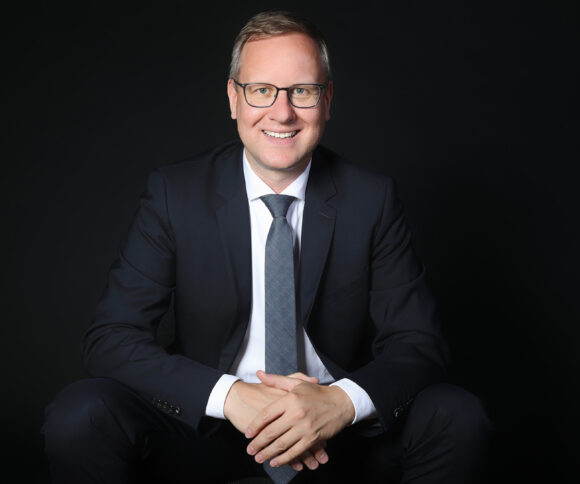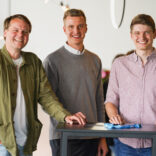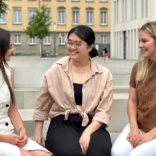
From Part-Time MBA to a Career in Entrepreneurship
Career update: In December 2020 Daniel Zinner co-founded Noah Mobility GmbH. Since August 2021 he is Associate Partner at CLEVIS
HHL Success Story: Interview with Daniel Zinner, Co-founder of HRGlobal, Kiez Digital and Podcast-Host
When Daniel Zinner started his studies at HHL it was not his primary intention to become an entrepreneur. Yet, after over ten years of working in the HR International / Global Mobility sector he was ready to reassess his career goals. In the past, he worked in International Human Resources at well-known companies like PricewaterhouseCoopers, Deutsche Bank and Bombardier.
MBA leads to a career in entrepreneurship
Today he is the co-founder of HRGlobal, an HR management consulting company and Kiez Digital, a digital communication agency. His companies maintain offices in Berlin and Frankfurt am Main. In addition to his work as a growth consultant, he launched the podcast “Berliner Zinner featuring Mehlhose” with his neighbor and friend Olaf Mehlhose.
In this interview, he shares his journey to becoming an entrepreneur and how studying at HHL taught him to test his ideas. Be sure to read the whole interview to learn how a SWOT analysis can be a useful tool to identify your own personal career goals after graduation.
“I am satisfied with my career achievements so far, I am actively working on providing growth solutions for individuals, corporations and society.”
We’ll start with your studies at HHL. What specifically made you decide to study for a part-time MBA?
In 2006 I finished my diploma in business studies which now translates into a Bachelor of business studies. At that time, I started working full-time at PricewaterhouseCoopers (PwC) in the area of expatriate management also known as Global Mobility or international Human Resources (HR).
Within this job, I worked on financial services clients with a focus on assuring regulatory compliance for companies’ international staff. My job was to prepare and review individual income tax returns and consult on other transfer related services conducted by internationals. Salaries in the lower 6-digits (Euros) were not uncommon and bonus payments easily made up 50% of the fixed salary income.
I distinctly remember a day in London where a former American high school quarterback – at a rather young age – had an annual total gross salary beyond the 1 Mio USD mark. I also noticed that all these investment bankers had done an MBA at a business school.
“Looking back, I was happy that I had chosen a business school in my home area, focused on digital business models, entrepreneurship and leadership.”
At that time, I thought: I am a qualified banker. I am flexible. The English language is not really a challenge and this earning prospect looks great! That’s when I started searching for MBA programs in Germany. I applied at EBS because of its proximity to Frankfurt and at HHL because I am a born Saxonian. The fact that I choose HHL in 2009/2010 was because of my friend Gaëtan who pointed out that HHL had the right community spirit.
The financial crisis in 2008/2009 brought to light what investment banking also could do with economies and people. Some salaries didn’t have substantial value to the economy nor to society. Therefore, even before I started my part-time MBA at HHL in 2010, my former goal of preparing for a steep salary increase had lost priority. At that time, I was happy that I had chosen a business school in my home area, focused on digital business models, entrepreneurship and leadership.
You describe yourself as an international entrepreneur and a growth consultant. What do these two business divisions entail and how do they complement each other?
International means I love different cultures and I strongly believe that diversity fuels creativity and eventually innovation. This will fuel economic growth.
As an entrepreneur, I am a big supporter of independent thinking and working. I love project-based work and the challenge of permanent reinvention. I also believe that collaboration is key to success. Connecting different worlds (e.g. old economy and startups, east and west, old and young, national and international) means making sure you have a great network that fuels different perspectives and eventually brings together the best team. This is why I founded the Berliner Zinner podcast format. To bring together different people with the right spirit for changing the employee-centric mindset in Germany.
“I love project-based work and the challenge of permanent reinvention. I also believe that collaboration is the key for success.”
With my HR, Marketing and venture building experience I am able to support all kinds of companies in their growth strategy. I can bring experience in general management, structure and strong communication skills to the table, which will help corporations to sustainably grow.
By being an expert, I add value to companies as a consultant. My entrepreneurial heart tells me to connect with other experts in their field to be able to change the status quo and at the same time assure quality. This is why I co-founded HRGlobal and Kiez Digital with strong partners, who are experts in the respective field.
Looking back at your time at HHL. How has studying a part-time MBA influenced your journey to entrepreneurship?
I have continuously self-reflected on my activities during the time after graduation. A lot of thinking happened during my employment years. One finding was that the bank I worked for at the time was not the right employer for me. I guess, changes in environment and cultural perception were the reasons.
“Take your own ideas to market and be passionate about it, always question status quo in order to make your service/product successful, treat people well and try to understand their position.”
Another finding on a different level was that my next employer also was not the right one for me after a couple of years. Although, the industry was and still is sustainable and promising.
Actually, it turned out that employment was not the right choice for me at this stage of my career. In corporations you are to some extent secure. At least this is what one typically believes when one has his/her unlimited employment contract in hands. By being employed you buy in to someone else’s idea and you get paid to function. Strategy and pace are given by the owners.
This is what I learned at HHL: Take your own ideas to market and be passionate about it, always question the status quo in order to make your service/product successful, treat people well and try to understand their often contrary position.
In addition, without HHL I could never have become president of the German Alumni Chapter of the world’s largest business honor society: Beta Gamma Sigma. A community that I value because of the members’ focus on lifelong learning, ethical leadership and international exchange.
The first 10+ years of your career were spent working in Global Mobility for international companies. What has your experience in entrepreneurship taught you?
I learned that renowned international companies can provide great opportunities in terms of global collaboration, reputation, learning and last but not least financial reward. Therefore, my biggest take-away was that you need to anticipate a significant salary drop in the short-term. However, that is okay! You might lose the annual yield which you got used to. However, what you win is much more valuable:
- You do something with purpose and you have fun.
- You create a corporate value that is yours and a great intangible asset.
- You can execute any idea you have and have full responsibility. You no longer have any excuse when complaining about a decision made by someone else. You are the decision-maker.
- Once you develop from expert freelancer to entrepreneur it is a great feeling.
As a freelancer you are independent and you sell your expertise. However, growing your knowledge business to the next level requires an organization to support you. Building this company requires your entrepreneurial spirit. Another nice side-effect is that as an ambitious employee you constantly try to move ahead in your corporate career. As an entrepreneur, you have achieved this goal immediately and you can put together your team and exercise leadership.
“Why not look at people who have come to Germany a generation ago and see what they have built by just doing and challenging themselves every day.”
Looking back, I would say I do not miss any of my employment stations, they helped me find my way to becoming a happy camper, who I am now. I am not corporate career-focused anymore, I am actively working on providing growth solutions for individuals, corporations and society.
You’ve recently launched the Podcast “Berliner Zinner featuring Mehlhose”. What is your vision for this podcast?
Our vision is to change the mindset in Germany on courage, ownership and responsibility. At the same time, we provide guidance through the essentials coming from our podcast interviews and help with our theme specials which we constantly develop. On a societal level, we want to support the idea and reality that international diversity is a good thing!
“Our vision is to change the mindset in Germany on courage, ownership and responsibility.”
Often, I experience complaining, entitlement thinking, demanding attitude and comparing oneself to other people. Why not look at people who have come to Germany a generation ago or maybe just two years ago and see what they have built by just doing and challenging themselves every day?
Do you have any advice for our graduates entering the job market?
The things you learned about running a successful and eventually profitable company during your studies can also be applied to yourself. Make sure to invest in yourself to be able to start growing. The good news is, having already accomplished your MBA or MSc you can tick this box!
Start thinking about your strategy: what you love, where you want to add value and what your family plans are. In addition, calculate unforeseeable changes in your life. Falling in love or having children are good examples.
“Do not plan too much. Be flexible and fast in reacting on changes on your career path.”
Put together a SWOT (Strengths, Weaknesses, Opportunities, Threats) analysis for yourself.
- Push the S and define your personal brand.
- Work on the W by continuous learning and looking for a mentor.
- Monitor the market to seize Os and be active in networking.
- Do your research on a macro, business and individual partner level to manage the T.
I’ve learned it’s important not to plan too much. Be flexible and fast in reacting to changes in your career path. Try to think long-term and do not put too much pressure on yourself in achieving your self-set goals in a certain period of time. It will all come naturally.
This interview was first published in November 2020.
Hi, I'm Petra. With my background as an engineer and my many years of experience at HHL, I am your subject matter expert for all inquiries on our study programs and gladly advise you about the different opportunities. I look forward to talking to you about your educational journey.


